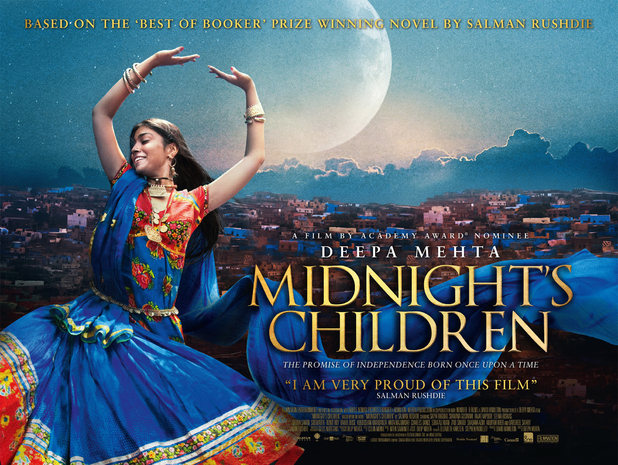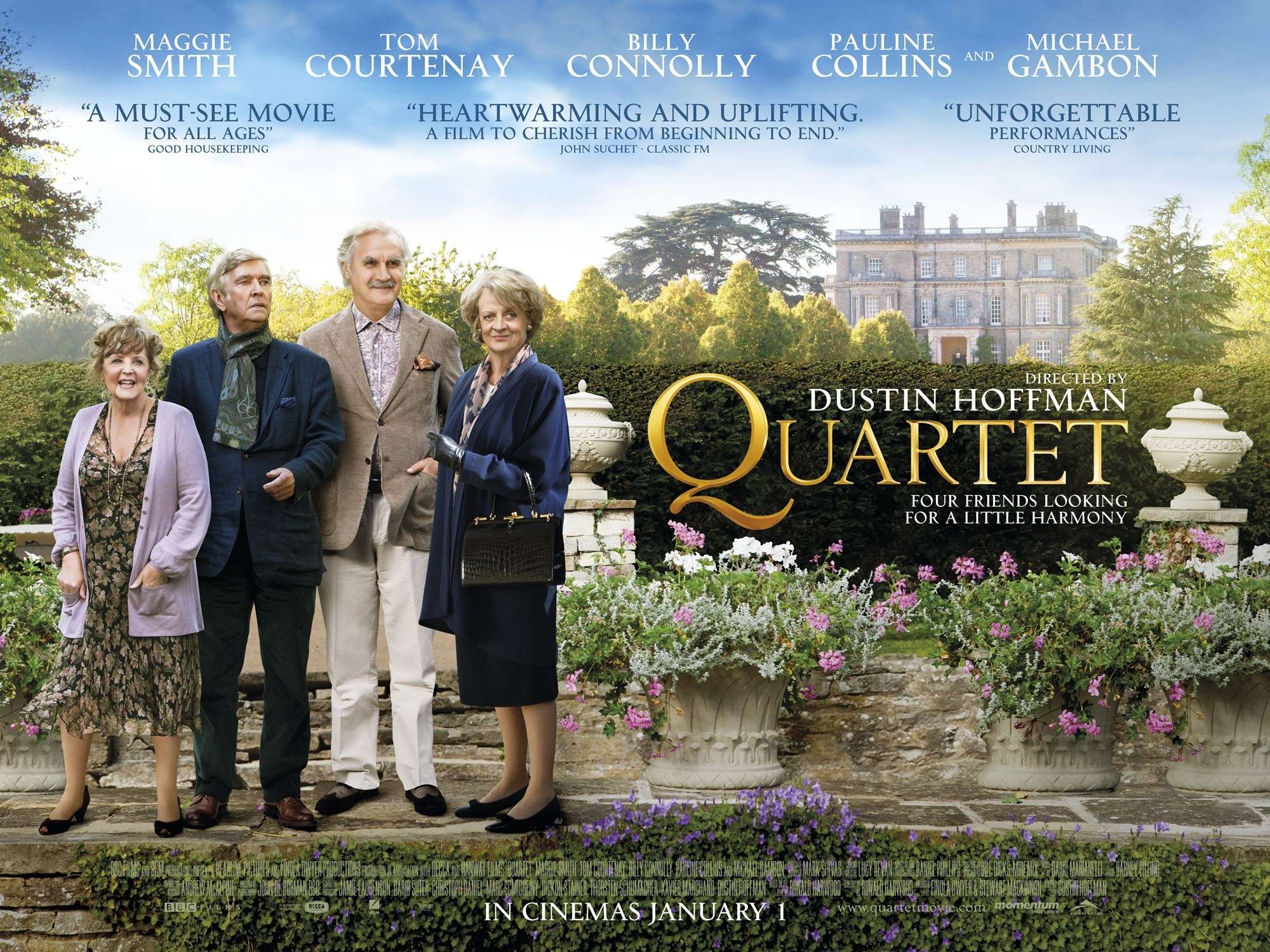And so, my first week of Project Tyneside, my attempt to see every new film at Newcastle's Tyneside Cinema, began this week, with a varied four films, shown from Thursday 3rd - Monday 7th. In order, here are my thoughts on all four.
Thursday 3 January, 11:10 Midnight's Children
Adapted for the screen by Salman Rushdie from his novel of the same name, Deepa Mehta's Midnight's Children tells the story of two baby boys, one the son of a rich family and the other the child of paupers, switched at birth on the eve of India's liberation from Britain. The scope of the film is impressive, spanning almost thirty years as it charts the rise of an independent India, the creation of Pakistan and the civil war that led to Bangladesh. Much of the film is, as you might expect, very beautiful and full of colour, but suffers from a sprawling, at times directionless narrative, symptomatic of a novel adaptation. Moreover, the film often dispenses with its characters very casually, rarely giving them their due as they abruptly met their fates. The script, too, sometimes lacks polish, and there are some true clangers to be had; one line about people being like flavours in food particularly sticks in the mind, and the ending, with the themes of rebirth and family, felt somewhat glib and shallow, given the intense traumas Saleem has suffered throughout his life. Midnight's Children is an enjoyable watch, but fails at the profundity to which it aspires.
Friday 4 January, 14:15 The Hobbit: An Unexpected Journey
I tried to like The Hobbit. I really did. It's no secret that I'm not a fan of the Lord of the Rings trilogy, but I do try (not always successfully) to go in to new cinema experiences with an open mind. But there's no getting around it: The Hobbit bored the shit out of me. Its main problem is that it is simply far too long: at nearly three hours, and two more films to go, this heavily-embellished adaptation of Tolkien's brisk children's book often feels like more of an endurance test than a well-crafted story. This problem is at its greatest with the interminable and unnecessary padding scenes, such as a subplot about the Necromancer, and po-faced discussions between Gandalf and Sarumon about the possible return of Sauron, all attempts to frame The Hobbit as a prequel trilogy to Lord of the Rings. But as an audience, we know already where things are going, and so these sequences simply clog up what should be a pacy, exciting story, where our characters leap from one perilous escapade to the next. Instead, what we get is endless, endless exposition, occasional and laughable heroic poses struck by Richard Armitage doing what he can in a one-note role as dwarfish prince, Thorin Oakenshield. More positively, Martin Freeman is very good as Bilbo, bringing believability and humanity to the role, and offering a far more compelling protagonist than the whiny little squirt we got in Lord of the Rings' Frodo. Ian McKellen, is predictably, on form as Gandalf, very comfortable in the role and bring warmth to a character that acts alternately as exposition generator and regular deus ex machina. The best part in the film is undoubtedly the Riddles in the Dark sequence, with Andy Serkis returning terrifically to his Gollum. It's simple, creepy and effective, with none of the self-important, portentous bollocks that dogs the exposition scenes, nor the distracting, overcrammed frame that Jackson has become fond of in his action scenes. Compared with the rest of the film, the Gollum scene is oddly well paced, feeling neither rushed nor overlong, and there is a clear and engaging narrative thread to it. Serkis, predictably, gives a fantastic, and scary performance, and the scene, for me at least, was realised just as I imagined it when I read the novel as a child. If only the rest of the film could have been like this.
Sunday 6 January, 20:00 Letters to Sofija
Monday 7 January, 13:50 Quartet
Dustin Hoffman, the two time-Oscar winner and star of all time classics such as Marathon Man, The Graduate, and Mr. Magorium's Wonder Emporium, gives us his directorial debut with Quartet, the story of four ageing opera singers who must perform one more time to save their retirement home. Or something. The script never makes it clear why exactly the Quartet, played by Billy Connolly, Pauline Collins, Tom Courtenay and the magnificent Maggie Smith, have to sing - a throwaway line about their home being closed does little to answer questions of exactly how much they're charging for tickets - but no matter, the focus in Quartet is not so much on nail-biting drama, or a serious, Haneke-esque exploration of age and decline, but rather, watching four experienced, well-loved and seasoned actors bounce off each other. And in that respect, Hoffman's film is a success. He directs surprisingly well, and for a subject that threatens to descend into ITV1 miniseries territory, Hoffman's direction, along with John de Borman's pleasing cinematography keeps proceedings just this side of cinematic. Also pleasing (and somewhat of a relief), is the scarcity of goofy, isn't-it-funny-that-they're-old style humour, and trite life lessons that the trailers threatened, instead offering some nice, albeit light, observations on regret, friendship and misunderstanding, though a go-nowhere scene involving some hip-hop kids proves one cliched observation too many. Finally, it's also good to see film makers finally waking up to the fact the older people have stories too, and shock of shocks, money to spend at the box office to see those stories realised. Whilst Quartet offers little in the realm of real drama, it does indicate a change in attitudes towards the older generation and the cinema, and for me, for now, that is most welcome.
Join me later next week for the next update on Project Tyneside, when I'll be looking at Les Miserables, Safety Not Guaranteed and The Sessions.
Sunday 6 January, 20:00 Letters to Sofija
Robert Mullan's Letters to Sofija tells the true story of Mikalojus Konstantinas Ciurlionis, an early twentieth-century Lithuanian painter and composer who married Sofija Kymantaite, an art critic and political dissident. This is a British production, but filmed entirely in Russian, Polish and Lithuanian, utilising very well Ciurlionis' own extensive catalogue of musical compositions. Lead actors Rokas Zubovas and Marija Korenkaite as Ciurlionis and the eponymous Sofija give understated but terrific performances, with Korenkaite particularly excellent, bringing dimension and pathos in a role that could otherwise have been simply a cipher for the film's central subject to bounce off. The cinematography by Odd-Geir Saether is crisp, and the colours often muted, evoking both a sense of place and time, whilst also complementing Ciurlionis' legacy as a painter. On the negatives, the narrative often lacks a sense of drive, and several plot twists either fizzle out, or at best make little sense, although the movement of the characters through their lives, swept up by chance and circumstance, often works well, and defies our demands as an audience for a structured drama. Here, the film seems to be saying, life rarely plays out it three or five neat little acts. More unforgivable, however, is the piece's villain, the jealous Captain Rostov, who, falling for Sofija, dogs her and her husband's lives as he vies for her affections. It feels as if there should be a more complex character here, with confused motivations and loyalties, but, frustratingly, the script rarely allows Rostov to rise above being a one-note pantomime baddie, appearing genuinely to care for Sofija's well being in one scene, before threatening to rape her in another. Overall, however, this is a passionate, lovingly-crafted account of an artist's life with whom many here will be unfamiliar, and if for no other reason, it is worth tracking down.
Monday 7 January, 13:50 Quartet
Dustin Hoffman, the two time-Oscar winner and star of all time classics such as Marathon Man, The Graduate, and Mr. Magorium's Wonder Emporium, gives us his directorial debut with Quartet, the story of four ageing opera singers who must perform one more time to save their retirement home. Or something. The script never makes it clear why exactly the Quartet, played by Billy Connolly, Pauline Collins, Tom Courtenay and the magnificent Maggie Smith, have to sing - a throwaway line about their home being closed does little to answer questions of exactly how much they're charging for tickets - but no matter, the focus in Quartet is not so much on nail-biting drama, or a serious, Haneke-esque exploration of age and decline, but rather, watching four experienced, well-loved and seasoned actors bounce off each other. And in that respect, Hoffman's film is a success. He directs surprisingly well, and for a subject that threatens to descend into ITV1 miniseries territory, Hoffman's direction, along with John de Borman's pleasing cinematography keeps proceedings just this side of cinematic. Also pleasing (and somewhat of a relief), is the scarcity of goofy, isn't-it-funny-that-they're-old style humour, and trite life lessons that the trailers threatened, instead offering some nice, albeit light, observations on regret, friendship and misunderstanding, though a go-nowhere scene involving some hip-hop kids proves one cliched observation too many. Finally, it's also good to see film makers finally waking up to the fact the older people have stories too, and shock of shocks, money to spend at the box office to see those stories realised. Whilst Quartet offers little in the realm of real drama, it does indicate a change in attitudes towards the older generation and the cinema, and for me, for now, that is most welcome.
Join me later next week for the next update on Project Tyneside, when I'll be looking at Les Miserables, Safety Not Guaranteed and The Sessions.




Awesome movie!!! it is a beautoful version of the novel and also adds great style. Liked it!
ReplyDelete